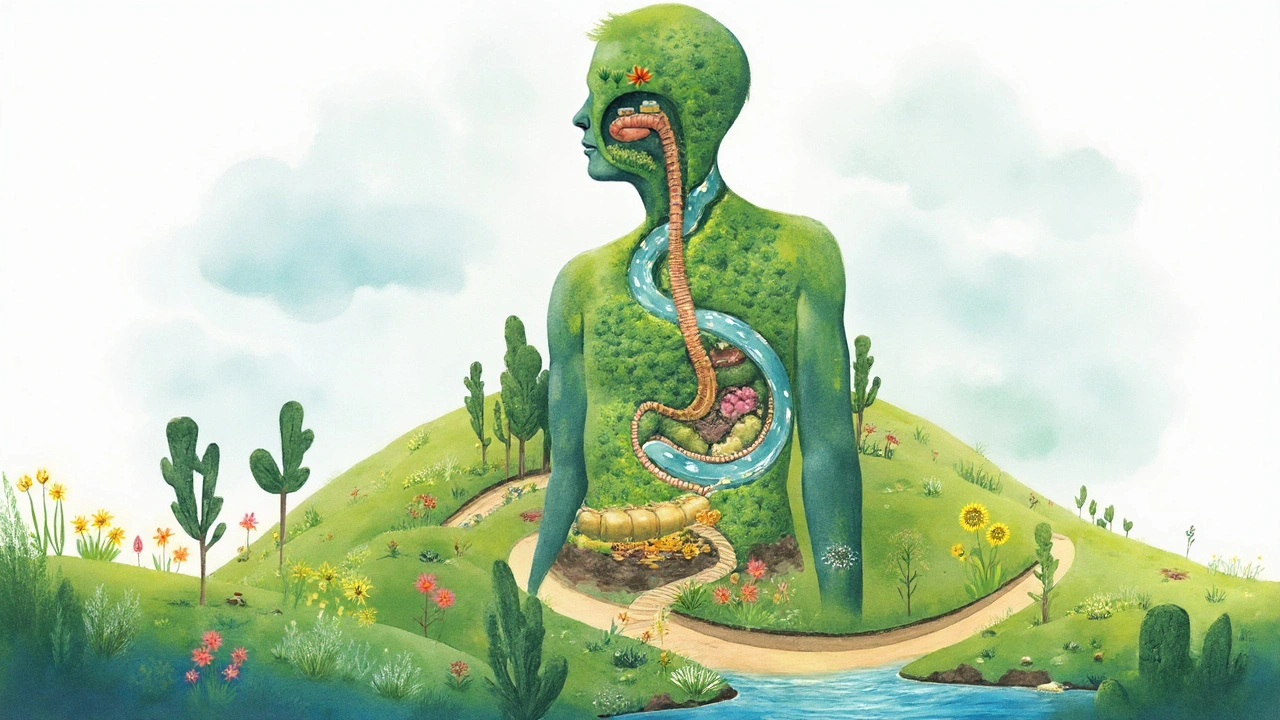Bloating Relief Quiz
Detox diet is a dietary regimen that claims to eliminate toxins, reset digestion, and reduce abdominal swelling. Throughout the past decade, wellness blogs and influencers have marketed these plans as the fastest route to a flatter stomach. But do they deliver on the promise of less bloating, or are they just another fad? This article breaks down the biology of bloating, examines the evidence behind detox protocols, and offers evidence‑based strategies you can trust.
What Causes Bloating?
Understanding bloating starts with the gut. When water retention spikes, or gas builds up from fermentable carbs, the abdomen feels distended. Two main drivers are:
- Dietary factors - high‑sodium meals, low fiber intake, and foods rich in fermentable oligosaccharides, disaccharides, monosaccharides and polyols (FODMAPs) trigger excess gas.
- Microbial activity - an imbalanced gut microbiome can ferment carbs unevenly, producing bloating‑inducing gases like hydrogen and methane.
Both mechanisms are linked to inflammation, sluggish motility, and even altered liver function, where the organ’s natural detox pathways may become overwhelmed.
Detox Diet Claims: The Common Playbook
Typical detox plans promise three outcomes:
- Flush out toxins via high‑water, low‑calorie meals.
- Reset the colon through fiber‑rich smoothies or laxatives.
- Boost metabolism with probiotics or fermented drinks.
Advertisers often cite “liver detoxification” as a science‑backed benefit, but the liver already processes waste efficiently in healthy adults. Adding more juice or a short‑term fasting window may alter water balance, giving a temporary “lighter” feeling-yet that’s not a permanent solution.
Scientific Evidence: Do Detox Diets Reduce Bloating?
Peer‑reviewed studies paint a mixed picture. A 2022 randomized trial comparing a 5‑day juice cleanse to a standard balanced diet found no significant difference in waist circumference or self‑reported bloating after the program ended. However, participants did report reduced perceived “heaviness” during the cleanse, likely due to lower sodium and carbohydrate load.
Another controlled study examined a high‑fiber, low‑FODMAP regimen-often marketed as a detox approach. Participants experienced a 30% drop in bloating scores after two weeks, but the improvement correlated strongly with reduced fermentable carbohydrate intake, not with any “toxin” removal.
Key takeaways from the literature:
- Short‑term calorie restriction can lower water retention, giving a temporary flat feeling.
- Increased fiber improves bowel transit, but excessive fiber without adequate hydration can worsen gas.
- Specific probiotic strains (e.g., Lactobacillus plantarum) have modest evidence for reducing bloating, yet most detox kits contain generic blends.

Practical Alternatives Backed by Research
If your goal is lasting relief, consider strategies that target the root causes identified above.
| Approach | Primary Mechanism | Evidence Strength | Typical Duration |
|---|---|---|---|
| Detox diet (juice cleanse) | Calorie & sodium reduction, temporary water loss | Low‑moderate | 3‑7 days |
| Low‑FODMAP diet | Limits fermentable carbs | High (multiple RCTs) | 2‑4 weeks (reintroduction phase) |
| Targeted probiotic supplementation | Modifies gut microbiome composition | Moderate (strain‑specific studies) | 4‑8 weeks |
| Increased water & balanced electrolytes | Reduces retention, supports motility | High (observational & intervention) | Ongoing |
| Mindful eating & chew‑more | Decreases swallowed air, improves digestion | Moderate | Immediate to weeks |
Notice how the low‑FODMAP approach directly tackles fermentable carbs, whereas the detox diet relies mostly on short‑term calorie cutbacks. For sustainable results, integrating fiber‑rich vegetables, adequate hydration, and the occasional probiotic is more reliable than a 3‑day cleanse.
How to Test Whether a Detox Diet Works for You
Because individual responses vary, try a personal experiment before committing to a month‑long plan:
- Track baseline bloating for five days using a simple diary (note meals, portion sizes, and symptom severity on a 0‑10 scale).
- Switch to a 48‑hour low‑calorie, low‑sodium regimen-think clear broth, cucumber, and plenty of water.
- Continue logging symptoms. If scores drop by more than 2 points and stay low for the next 48 hours, you’ve likely benefited from reduced water retention.
- Re‑introduce a normal diet and observe whether bloating returns. A quick rebound suggests the effect was temporary.
Documenting this data gives you concrete proof-no need to trust marketing hype.
Related Concepts Worth Exploring
While detox diets occupy a noisy corner of wellness, several adjacent topics deserve attention:
- Colon cleanse procedures-often marketed alongside detox diets-have limited scientific backing and can sometimes cause electrolyte imbalances.
- Inflammatory bowel conditions such as IBS may require specialized dietary protocols beyond generic detox plans.
- The role of sodium intake in fluid balance is a straightforward lever to manage bloating without drastic calorie cuts.
- Exploring gut microbiome diversity through fermented foods can provide long‑term improvements.
Each of these areas expands the conversation from a quick fix to a holistic view of digestive health.
Bottom Line: Are Detox Diets Worth It?
In short, detox diets may give a fleeting sense of relief by reducing sodium and calories, but they don’t address the underlying microbial or dietary drivers of chronic bloating. A balanced approach-low‑FODMAP foods when needed, targeted probiotics, consistent hydration, and mindful eating-delivers measurable, lasting results backed by clinical data.
If you decide to try a detox plan, treat it as a short experiment rather than a permanent solution. The real work lies in building habits that keep your gut happy day after day.

Frequently Asked Questions
Do detox diets actually eliminate toxins from the body?
The liver and kidneys already handle toxin clearance efficiently in healthy adults. Most detox plans rely on calorie restriction and increased fluid intake, which can temporarily lower water weight but don’t increase the body's ability to eliminate waste.
Why does bloating happen after eating certain foods?
Foods high in FODMAPs (like onions, garlic, beans, and wheat) are fermented by gut bacteria, producing gases such as hydrogen, methane, and carbon dioxide. These gases distend the intestine, creating the sensation of bloating.
Can probiotics really reduce bloating?
Certain strains-especially Lactobacillus plantarum and Bifidobacterium infantis-have demonstrated modest reductions in bloating in controlled trials. However, benefits are strain‑specific; generic probiotic blends may not provide the same effect.
Is a low‑FODMAP diet safer than a detox cleanse?
Low‑FODMAP diets are evidence‑based and tailored to reduce fermentable carbs while still providing adequate nutrition. Detox cleanses often lack essential nutrients and can cause electrolyte imbalances if prolonged.
How much water should I drink to prevent bloating?
A general guideline is 2‑3 liters per day for adults, adjusted for activity level and climate. Proper hydration supports bowel motility and helps the kidneys flush out excess sodium, reducing water retention.
Are colon cleanse kits safe?
Most over‑the‑counter kits rely on high‑dose laxatives or herbal diuretics, which can cause dehydration, electrolyte loss, and dependency. Unless prescribed for a specific medical condition, they are generally not recommended.


Gayle Jenkins
September 24, 2025 AT 19:01I tried that 5-day juice cleanse last month and honestly? My belly felt lighter for like two days, then BAM back to normal. I thought I was magic but turns out I just drank less sodium and water weight dropped. No magic detox, just basic math. Still, it felt good to reset for a bit.
Kaleigh Scroger
September 25, 2025 AT 16:32Look I get why people fall for detox hype it's everywhere but the real issue is we're not taught how our guts work in school so we grab whatever looks shiny and green. The low-FODMAP thing isn't sexy like juice cleanses but if you actually track your food for two weeks you'll see patterns. I used to eat a ton of garlic bread and wonder why I felt like a balloon. Cut the garlic onions and beans? Overnight difference. No magic. Just science. And hydration. Always hydrate.
Elizabeth Choi
September 27, 2025 AT 05:13Detox diets are a scam designed to sell overpriced smoothies and make people feel guilty for eating bread. The liver doesn't need a reset it's a supercomputer that's been working since you were born. If you're bloated it's because you're eating like a teenager who just discovered fast food. Stop blaming toxins and start blaming your diet.
Allison Turner
September 28, 2025 AT 14:13Everyone's so obsessed with detoxes but nobody wants to just eat less junk. It's not rocket science. Stop buying into this nonsense. You don't need a 7-day cleanse you need to stop eating chips and soda. Simple. Done. Why is this even a conversation?
Darrel Smith
September 30, 2025 AT 01:21They're lying to you. The food industry and the wellness scam machine are working together to keep you dependent on their products. They don't want you to know that your body is perfectly designed to clean itself. They want you to keep buying $20 bottles of 'detox tea' that are just sugar water with a fancy label. Wake up. This isn't health it's capitalism dressed up as self-care.
Aishwarya Sivaraj
October 1, 2025 AT 16:26when i first moved to the us i thought detox meant drinking lemon water and crying into my kale salad lol. i had no idea bloating was from fodmaps. my grandma in india just ate ginger tea after meals and said it helped. turns out she was right all along. no fancy juice, no cleanse. just simple things. also drink water. i forget to drink water and then i feel like i swallowed a basketball. sorry for typos typing on phone
Iives Perl
October 2, 2025 AT 15:54They're watching you. The detox industry is funded by Big Pharma to keep you confused. Your gut microbiome is being manipulated. They want you to buy supplements so they can track your data. Drink tap water. Avoid probiotics. Trust your body. 🕵️♂️